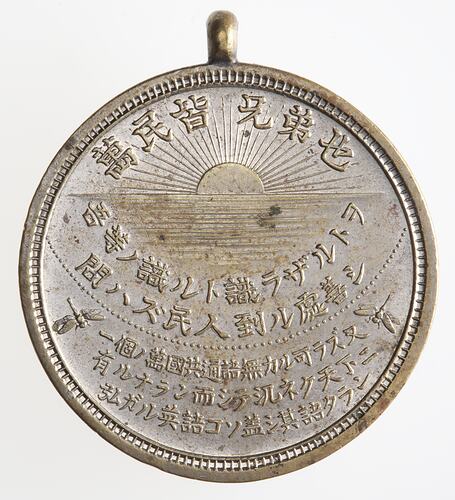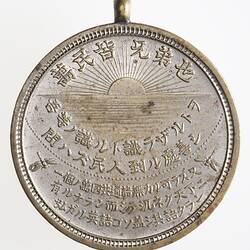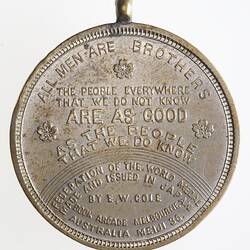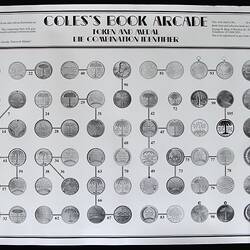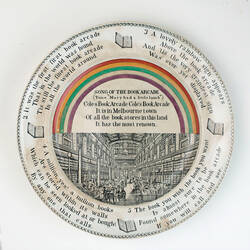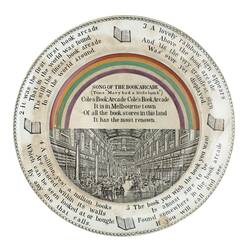Summary
Australia Victoria Melbourne
Medal - Cole's Book Arcade Federation of the World, 1903 (AD)
Mint: not recorded
Silvered brass medal with loop mount, issued by Coles Book Arcade, Melbourne. 'MEIJI 36' dates the medal to 1903. The medal has some Japanese text and may have been issued in Japan.
This was one of a series of medals offering maxims and proverbs chosen by E.W. Cole. At times when attendances were exceptionally large a charge of three pence was made for admission to some parts of the Arcade and one of the medals was given. They had a purchasing power of three pence in any part of the store.
Obverse Description
Rising sun and Japanese text.
Reverse Description
Text; 'ALL MEN ARE BROTHERS / THE PEOPLE EVERYWHERE / THAT WE DO NOT KNOW / ARE AS GOOD / AS THE PEOPLE / THAT WE KNOW / FEDERATION OF THE WORLD MEDAL / MADE AND ISSUE IN JAPAN / BY E. W. COLE / BOOK ARCADE MELBOURNE / AUSTRALIA MEIJI 36'.
Significance
E. W. Cole appears to have issued at least 70 medals, which one author remembers were valued at 3d in the Arcade, where they were often given as change and could be 'spent' on other Arcade purchases.
In 1865 Cole established a book stall at the Eastern Market (Paddy's Market) in Melbourne. He sold both new and second hand books. By 1873 he was ready to expand, and opened a Book Arcade in Bourke Street, between Russell Street and the Eastern Market. In the early 1870s the Melbourne City Council decided to clean up the market site. Redevelopment cost about 100,000 pounds, but it was not successful and became known as 'Melbourne's White Elephant'. Cole saw an opportunity, and leased out the whole premises, covering nearly three acres of land. He invited small holders including several hundred butchers to erect stalls rent free for the first six months. In 1882, when the City Council did not meethis request for a three-year lease, Cole instead negotiated a lease on 40-42 Bourke Street East. His new Arcade opened in 1883, and soon expanded from Bourke Street to Collins Street.
Coles' Arcade had the atmosphere of a circus, including mechanical monkeys and hens, but Cole's employees genuinly loved books and had a strong knowledge of literature. He had an enormous stock of new and second hand books, and took large numbers of remainders. He sold many books cheaply, and often bought up stocks of English publications which he re-bound with Coles title pages and, in the case of children's books, with the characteristic rainbow cover and new titles such as 'Cole's Rainbow (or Empire, or Great &c) Story Book'. Cole's most well-known was the self-produced publication 'Cole's Funny Picture Book', perhaps the most popular children's book published in Australia in the period 1890-1940. Around 630 000 copies were sold. Cole was self-educated, but he had an eye for collecting snippets, pithy sayings and appealing drawings. His Funny Picture books crowded riddles, rhymes, amusing anecdotes and drawings together.
Cole appears to have issued at least 80 types of medals, which one author (Moss, below) remembers were valued at 3d in the Arcade, where they were often given as change and could be 'spent' on other Arcade purchases. By 1890 Cole claimed to have issued 200,000 medals.
The business continued to operate after Cole's death around 1923-4, finally closing in 1929. Cole's daughter, Linda, continued to publish the Funny Picture Books, and her son, Cole Turnley, maintained promotions and sales of successive editions. -Marcie Muir, Australian Scholarly Editions Centre web site, http://idun.itsc.adfa.edu.au/ASEC/HOBA96 - Papers/muir.html 22/9/2003; H.P. Moss. 1952. 'The Medals of E.W. Cole'. The Numsimatic Association of Victoria. Vol. 7. No. 3. September 1952 and Vol. 7. No. 4. October 1952. -D. Tout-Smith 22/9/2003.
More Information
-
Collection Names
-
Collecting Areas
-
Acquisition Information
Purchase
-
Date Issued
1903 AD
-
Issued By
Mr. Edward W. Cole - Cole's Book Arcade, Melbourne, Greater Melbourne, Victoria, Australia, 1903
-
Place Named
-
Inscriptions
Obverse: Rising sun and Japanese text. Reverse: ALL MEN ARE BROTHERS / THE PEOPLE EVERYWHERE / THAT WE DO NOT KNOW / ARE AS GOOD / AS THE PEOPLE / THAT WE KNOW / FEDERATION OF THE WORLD MEDAL / MADE AND ISSUE IN JAPAN / BY E. W. COLE / BOOK ARCADE MELBOURNE / AUSTRALIA MEIJI 36.
-
Material
Silvered Brass
-
Classification
-
Category
-
Discipline
-
Type of item
-
Overall Dimensions
31 mm (Outside Diameter)
-
Shape
Round with loop
-
References
Chitty 78 = Dean 93
-
Keywords
